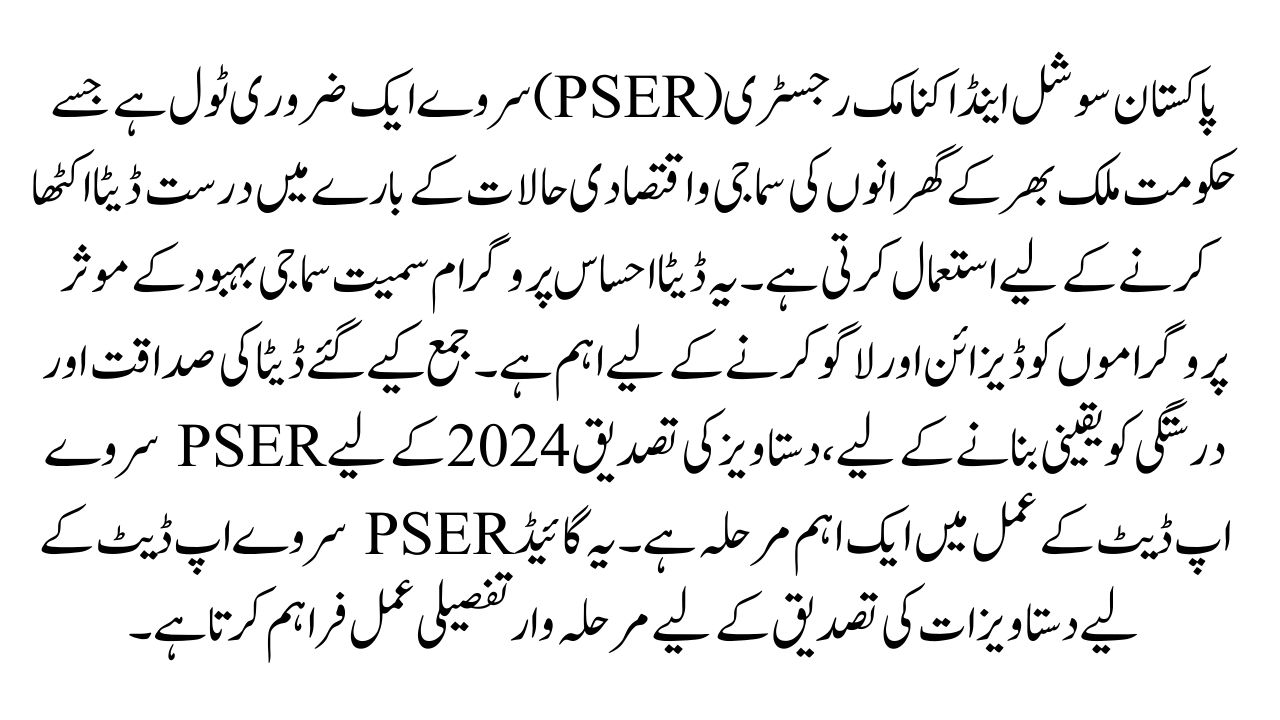Learn how to verify documents for the PSER Survey Update 2024 with this comprehensive guide. Ensure accurate data collection by following the step-by-step process for submitting and verifying your documents, including eligibility checks, document preparation, and submission methods.
Complete Process to Verify Documents for PSER Survey Update 2024
The Pakistan Social and Economic Registry (PSER) survey is an essential tool used by the government to collect accurate data on the socio-economic conditions of households across the country. This data is crucial for designing and implementing effective social welfare programs, including the Ehsaas Program. To ensure the authenticity and accuracy of the data collected, document verification is a vital step in the PSER survey update process for 2024. This guide provides a detailed step-by-step process to verify documents for the PSER survey update.
Introduction
The PSER survey aims to collect comprehensive information about households, including income levels, employment status, education, health, and living conditions. Accurate data collection and verification are critical to the success of this initiative, as it directly influences policy-making and the allocation of resources for social welfare programs.
Step-by-Step Process for Document Verification
1. Initial Survey Participation
To participate in the PSER survey, households must first complete the initial survey form. This can be done online through the official PSER website or through field officers conducting door-to-door surveys. The survey form collects preliminary data, including:
- Household demographics
- Income sources
- Employment details
- Education levels
- Health status
2. Notification for Document Verification
Once the initial survey form is submitted, the data is reviewed by the PSER team. Households selected for document verification will receive a notification via SMS, email, or a visit from a field officer. This notification will provide details on the documents required for verification and the deadline for submission.
3. Preparation of Required Documents
Households must prepare the following documents for verification:
- Computerized National Identity Cards (CNICs) of all household members
- Proof of residence (e.g., utility bills, rental agreements)
- Income statements or salary slips
- Employment verification letters or contracts
- Education certificates or school enrollment letters
- Health records or medical reports
It is crucial to ensure that all documents are up-to-date and accurately reflect the information provided in the initial survey form.
4. Document Submission
Documents can be submitted for verification through various methods:
- Online Submission:
- Visit the official PSER website and log in to your account.
- Navigate to the document submission section.
- Upload scanned copies of the required documents.
- Ensure that each document is clear and legible.
- In-Person Submission:
- Visit the nearest PSER verification center or designated government office.
- Carry original documents along with photocopies.
- Submit the documents to the designated officer for verification.
- Field Officer Collection:
- If notified, a field officer may visit your residence to collect the documents.
- Ensure that you provide the officer with the necessary documents and obtain a receipt for submission.
5. Verification Process
Once the documents are submitted, the PSER verification team will review them to ensure their authenticity. The verification process includes:
- Cross-checking Information:
- Comparing the submitted documents with the initial survey data to identify any discrepancies.
- Verifying the authenticity of documents with the issuing authorities.
- Home Visits:
- In some cases, the verification team may conduct home visits to verify the living conditions and cross-check the information provided.
6. Notification of Verification Status
After the verification process is completed, households will receive a notification regarding the status of their document verification. This notification will indicate whether the documents have been:
- Approved: If all documents are verified and found to be accurate, the household’s data will be updated in the PSER registry.
- Pending: If there are any discrepancies or missing documents, the household will be notified to provide additional information or corrections.
- Rejected: If the documents are found to be inaccurate or fraudulent, the household’s data may be rejected, and further action may be taken.
7. Appeals and Re-Verification
Households whose documents are rejected or marked as pending can appeal the decision and request re-verification. The appeal process includes:
- Submitting an Appeal:
- Contact the PSER helpline or visit the official website to submit an appeal.
- Provide additional documents or corrections as required.
- Re-Verification Process:
- The PSER team will review the appeal and conduct re-verification.
- Households will be notified of the final decision after re-verification.

Benefits of Accurate Document Verification
Accurate document verification is crucial for the success of the PSER survey and the effective implementation of social welfare programs. Benefits include:
- Targeted Assistance: Ensures that social welfare programs reach the most deserving and eligible households.
- Policy Formulation: Provides reliable data for policymakers to design and implement effective social and economic policies.
- Resource Allocation: Facilitates the equitable distribution of resources to address socio-economic disparities.
Conclusion
The document verification process for the PSER survey update in 2024 is a critical step to ensure the accuracy and authenticity of the data collected. By following the detailed steps outlined in this guide, households can effectively participate in the verification process, contributing to the success of the PSER initiative and the overall socio-economic development of Pakistan. Accurate data collection and verification not only benefit individual households but also support the broader goal of creating a more equitable and prosperous society.

